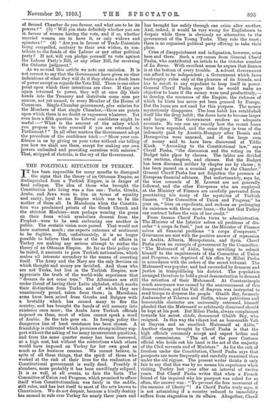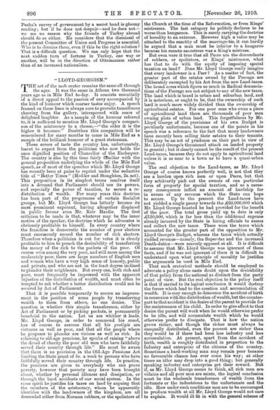THE POLITICAL SITUATION IN TURKEY.
IT has been impossible for many months to disregard the signs that the theory of an Ottoman Empire, as distinguished from a Turkish Empire, is in danger of final collapse. The idea of those who brought the Constitution into being was a fine one : Turks, Greeks, Arabs, and Jews were to live on terms of equality and amity, loyal to an Empire which was to be the mother of them all. In Macedonia when the Constitu- tion was proclaimed priests of the Greek Church and the strictest Moslems—men perhaps wearing the green on their fezes which symbolises descent from the Prophet—were to be seen embracing one another in public. The ecstatic vision soon passed. That would not have mattered much ; one expects extremes of sentiment to be fugitive. But, unfortunately, it is no longer possible to believe that those at the head of affairs in Turkey are making any serious attempt to realise the theory of an Ottoman Empire. So far as their policy can be tested, it amounts to pure Turkish nationalism, which makes all interests secondary to the means of asserting itself. The Army and the Navy are the only Services on which thought and money are lavished. And those who are not Turks, but live in the Turkish Empire, now appreciate the truth of the world-wide experience that "dreams do not come true." The Albanians are still under threat of having their Latin alphabet, which marks their distinction from Turks, and of which they are unanimously proud, taken from them; in Macedonia arms have been seized from Greeks and Bulgars with a brutality which has caused many to flee the country, and has brought the bands of evil memory into existence once more ; the Arabs have Turkish officials imposed on them, most of whom cannot speak a word of Arabic. So the tale goes on. In foreign policy the dangerous line of least resistance has been chosen. A friendship is cultivated which promises strong military sup- port without the asking of too many inconvenient questions, and from the same quarter money has been borrowed, at a high cost, but without the restrictions which others would have imposed on Turkey for her own good as much as for business reasons. We cannot believe, in spite of all these things, that the spirit of those who worked at the risk of their lives for the realisation of Constitutional government is really dead. Possibly it slumbers, more probably it has been unwillingly eclipsed. It is as well, at all events, to face the facts. The Committee of Union and Progress, which promised to efface itself when Constitutionalism was fairly in the saddle, still rules, and has lent itself to most of the arts known to Chauvinism. We do not despair, because a kindly destiny has seemed to rule over Turkey for nearly three years and. has brought her safely through one crisis after another. And, indeed, it would be very wrong for Englishmen to despair while there is obviously no alternative to the government of the Young Turks. They rule the roast ; there is no organised political party offering to take their place.
Cries of disappointment and indignation, however, arise here and there. Such a cry comes from General Cherif Pasha, who contributed an article to the October number of La Revue. With excellent sense he argues that finance is at the bottom of every trouble. A solvent Government can afford to be independent ; a Government which faces bankruptcy rules only at the pleasure of its friends, and has to resort to any expedient to keep itself in power. General Cherif Pasha says that he would make no objection to loans if the money were used productively,— to develop the resources of the Empire, the richness of which he hints has never yet been guessed by Europe. But the loans are not used for this purpose. The money mysteriously disappears. The loan habit has established itself like the drug habit ; the doses have to become larger and larger. The Government renders no adequate accounts. No one can say exactly how the recent loans have been expended, and the same thing is true of the indemnity paid by Austria-Hungary after Bosnia and Herzegovina were annexed, and of the large sum of money said to have been discovered at Yildiz Kiosk. "According to the Constitutional law," says Cherif Pasha, "the discussion and the voting on the Budget take plp.ce by clauses. The tables are divided into sections, chapters, and clauses. But the Budget has been discussed neither by chapter nor by clause ; it has been passed on a nominal appeal to the Chamber." General Cherif Pasha has not forgotten the presence of European financial advisers. But unfortunately, says he, the wise counsels of M. Laurent are not generally followed, and the other Europeans who are employed at the Ministry of Finance are carefully prevented from penetrating too many of the mysteries of Turkish finance. "The Committee of Union and Progress," he goes on, "lives on expedients, and reckons on prolonging its existence with three more loans,—the last that Turkey can contract before the ruin of her credit."
From finance Cherif Pasha turns to administration. The Minister of the Interior solves all problems of dis- order "a coups de fusil," just as the Minister of Finance solves all financial problems " coups d'emprunts." Grievances are met with the positive answer of repression in Arabia, Albania, Mesopotamia, and Syria. Cherif Pasha gives an example of government by the Committee. "The Mutessarif of Aidin, being unwilling to submit himself to the requirements of the Committee of Union and Progress, was deprived of his office by Hilmi Pasha in accordance with the orders of the secret tribunal. The Mutessarif was popular, and had succeeded by firmness and. justice in tranquillising his district. The population arranged therefore to hold a great demonstration to demand the retention of their Mutessarif. At Constantinople much annoyance was caused by the announcement of this demonstration, and the Vail of Smyrna was instructed to send troops to disperse the people Ghalib Bey, formerly Ambassador at Teheran and Berlin, whose patriotism and honourable character are universally esteemed, himself pleaded that the Mutessarif so arbitrarily dismissed should be kept at his post. But Hilmi Pasha, always complaisant towards his secret chiefs, denounced Ghalib Bey, who resigned. In this way the vilayet lost an honourable Vali at Smyrna and an excellent Mutessarif at Alain." Another charge brought by Cherif Pasha is that the high officials commonly accept and expect bribes and. illicit commissions. "The act of the poor Customs official who holds out his band is the act of the majority of the Civil servants and of Ministers." As for the cult of freedom under the Constitution, Cherif Pasha says that passports are more frequently and carefully examined than under the old regime. The present writer thinks it only fair to say that this was by no means his experience when visiting Turkey last year after an interval of twelve years. But Cherif Pasha writes that when a French friend of his inquired why his passport was asked for so often, the answer was : "To prevent the free movement of the enemies of liberty " ! As Cherif Pasha truly says, it is not astonishing if a country reduced to immobility suffers from stagnation in its affairs. Altogether, Cherif Pasha's survey of government by a secret band is gloomy reading ; but if he does not despair—and he does not— we see no reason why the friends of Turkey abroad should do so either. He considers that the dismissal of the present Committee of -Union and Progress is essential. Who is to dismiss them, even if this be the right solution? That is a difficult question. We can only hope that the next sudden turn of fortune in Turkey, one way or another, will be in the direction of Ottomanism rather than of an increased nationalism.



















































 Previous page
Previous page